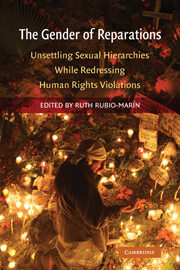Book contents
- Frontmatter
- Contents
- Acknowledgments
- Contributors
- Photo Credits: “Gender, Memorialization, and Symbolic Reparations,” in The Gender of Reparations
- International Center for Transitional Justice (ICTJ)
- Introduction: A Gender and Reparations Taxonomy
- 1 Gender and Violence in Focus: A Background for Gender Justice in Reparations
- 2 The Gender of Reparations in Transitional Societies
- 3 Reparation of Sexual and Reproductive Violence: Moving from Codification to Implementation
- 4 Reparations as a Means for Recognizing and Addressing Crimes and Grave Rights Violations against Girls and Boys during Situations of Armed Conflict and under Authoritarian and Dictatorial Regimes
- 5 Repairing Family Members: Gross Human Rights Violations and Communities of Harm
- 6 Tort Theory, Microfinance, and Gender Equality Convergent in Pecuniary Reparations
- 7 Gender, Memorialization, and Symbolic Reparations
- 8 Gender and Collective Reparations in the Aftermath of Conflict and Political Repression
- Index
- References
2 - The Gender of Reparations in Transitional Societies
Published online by Cambridge University Press: 25 August 2009
- Frontmatter
- Contents
- Acknowledgments
- Contributors
- Photo Credits: “Gender, Memorialization, and Symbolic Reparations,” in The Gender of Reparations
- International Center for Transitional Justice (ICTJ)
- Introduction: A Gender and Reparations Taxonomy
- 1 Gender and Violence in Focus: A Background for Gender Justice in Reparations
- 2 The Gender of Reparations in Transitional Societies
- 3 Reparation of Sexual and Reproductive Violence: Moving from Codification to Implementation
- 4 Reparations as a Means for Recognizing and Addressing Crimes and Grave Rights Violations against Girls and Boys during Situations of Armed Conflict and under Authoritarian and Dictatorial Regimes
- 5 Repairing Family Members: Gross Human Rights Violations and Communities of Harm
- 6 Tort Theory, Microfinance, and Gender Equality Convergent in Pecuniary Reparations
- 7 Gender, Memorialization, and Symbolic Reparations
- 8 Gender and Collective Reparations in the Aftermath of Conflict and Political Repression
- Index
- References
Summary
Much has been written, over the last two decades, about the ways gender plays a role in generating, or at least shaping, the forms and the effects of political violence perpetrated under authoritarian regimes and during armed conflict. This literature describes how women suffer as a result of activities that target civilians. It also testifies to the ways women are specifically targeted because of their political agency, their engagement in peace processes, their involvement in communal forms of life, their roles as mothers or family members, and their fight for truth and justice for their loved ones. If some of the reasons for targeting women are gender specific, so are some of the forms of violence women encounter as well as the short- and long-term effects of violence in their lives. Thus, women are more frequently subject to sexual and reproductive violence than men are. They also experience forms of domestic enslavement more often. Finally, women bear the brunt of the consequences of violent actions that target their men, as can be attested to by the many single-headed households after conflict, the vivid expressions of the pain of the mothers of the disappeared, or the overrepresentation of women among the refugees or internally displaced populations in scenarios of conflict. If this is true for women, the gender-specific reasons, forms, and effects of large-scale political violence that disparately impact on men remain to this day largely unexplored.
- Type
- Chapter
- Information
- The Gender of ReparationsUnsettling Sexual Hierarchies while Redressing Human Rights Violations, pp. 63 - 120Publisher: Cambridge University PressPrint publication year: 2009
References
- 15
- Cited by

